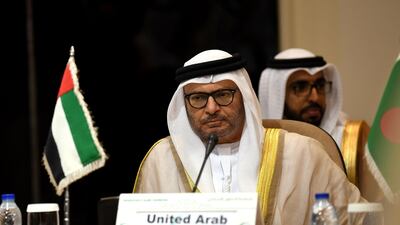The Arab Coalition fighting against the Iranian-backed Houthi rebels in Yemen is preparing for the next phase in the war, the UAE’s Minister of State for Foreign Affairs Dr Anwar Gargash said on Sunday.
Saudi Arabia and the UAE are leading the grouping of Arab nations that intervened in Yemen in 2015 to try to restore the internationally recognised government, which was pushed out of Sanaa by the rebels in late 2014.
"The coalition is preparing for the next phase with its political and military tools and is determined to achieve its strategic objectives," Dr Gargash wrote on Twitter.
The coalition “repelled attempts to change the balance of power and restored the government and what now remains is restoring sustainable political stability,” he added.
Last week, Dr Gargash reiterated the UAE's commitments to provide aid to the war-torn country.
Both Abu Dhabi and Riyadh are "the largest humanitarian donors in Yemen and will always fulfill their commitments", Dr Gargash said.
The UAE provided $5.59 billion (Dh20.53bn) in aid to Yemen between April 2015 and June 2019, assisting 17.2 million Yemenis in every governorate of the country – including Houthi heartlands such as Saada.
The United Nations has said that Yemen is the world's worst humanitarian disaster, with millions on the brink of famine and deadly illnesses such as cholera resurgence.
"Both the Saudi Arabia and the UAE are currently working with the UN on the modalities of the 2019 commitment to ensure maximum benefits for the Yemeni people," Dr Gargash said.
The conflict has killed tens of thousands of people since March 2015, according to the World Health Organisation.
It has also displaced millions and left 24.1 million – more than two thirds of the population – in need of aid.
Meanwhile, UN-led mediation efforts in Yemen continued with focus on implementing a ceasefire and withdrawal of troops from the port city of Hodeidah.
"My hope is that progress in Hodeidah will finally allow us to focus on the political process, and I hope that we will see this before the end of this summer," the UN Special Envoy to Yemen, Martin Griffiths, told the Security Council on Thursday.
The Yemeni city became the focal point of the war last year, when the coalition attempted to take it back from the rebels.
Hodeidah is Yemen's main supply line for millions of Yemeni civilians.


